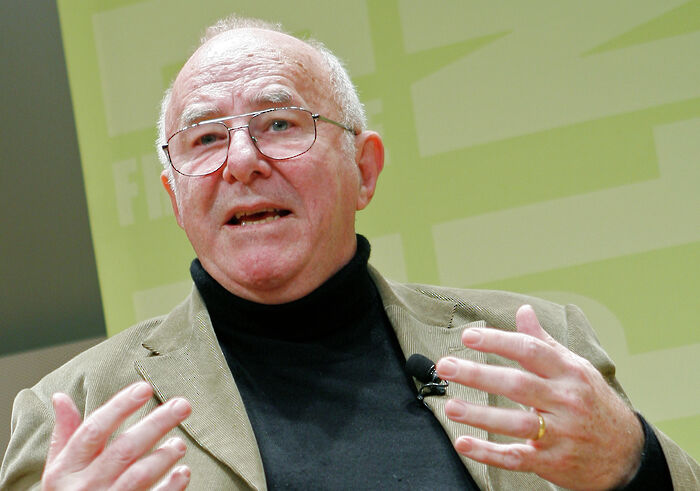The ultimately tragic life of Roger Scruton (1944-2020)
Harry Goodwin paints a picture of the man who argued for the absolute centrality of beauty, and, to his downfall, that of politics.
Content note: This article contains brief mention of suicide.
Shoes on the Danube Bank, an iron sculpture on the east bank of the Danube in Budapest, is one of the more beautiful artworks I’ve seen. It commemorates the 20,000 Jews who in 1945 were shot and dumped in the river by Hungarian fascists. I saw it in 2018, during a Hungarian election in which Viktor Orbán maintained his hold on power partly by peddling unhinged anti-Semitic conspiracies.
Roger Scruton, the conservative intellectual who died this month, was as eloquent a defender of beauty’s importance in life and art as Britain has ever known; he was also among its most shameless apologists for Orbán’s gutter nationalism. His life, like the sculpture, spanned extremes of beauty and ugliness.
His life spanned extremes of beauty and ugliness.
Scruton’s childhood was overshadowed by his drunkard father, a socialist who stopped speaking to his son when the latter got into Cambridge. Adolescent rebellion made a Tory out of Scruton. When he was a young academic, left-wing colleagues considered Scruton’s lukewarm support for Margaret Thatcher a blatant act of treachery. In life and on the page, Scruton never lost the air of awkward vulnerability his formative years gave him. His first marriage ended in heartbreak and near-suicidal depression.
As if to escape it all, Scruton threw himself into the struggle to support dissidents in Communist Czechoslovakia. He risked detention and torture in his efforts to help the underground education network, and came to love the ‘shy, cynical’ Czechs. Watching dissidents sacrifice everything to preserve Europe’s cultural inheritance instilled Scruton with a similar passion. His was however far more striking in its intensity. Unsubdued was his hatred for celebrity intellectuals like Eric Hobsbawm, who achieved fame by excusing the Soviet Union’s worst savageries; yet he accepted the blessing of the British establishment with knighthoods and the like.
Long after the Berlin Wall fell, the Cold War coloured everything Scruton wrote. He was as enthusiastic penning hatchet-jobs of hip left-wing thinkers as he was working towards an elegiac Tory philosophy of everything: art, freedom, God, sex, England. His fellow Tory intellectual Maurice Cowling, a far greater thinker and a far smaller man, observed that Scruton’s commitment to high culture had become a kind of religion.
Scruton’s books – he wrote over fifty - are charming, learned and fun. They are sometimes even persuasive, though persuasion was never really the point. I used to love them, until in the months after my visit to Hungary, Scruton became more and more strident in his apologias for the country’s racist, hypocritical and historically revisionist regime.
Politics was the main current of his life. Beauty knows no greater foe.
He failed to see through the former dissident Orbán’s schtick about Christian values and national autonomy, just as he failed to see through the New Statesman journalist who consciously distorted Scruton’s ignorant prattling about Hungarian politics to give the impression that Scruton was himself an anti-Semite. The same journalist later bragged in a champagne-swilling Instagram post that he had ended the career of the ‘right-wing racist and homophobe Roger Scruton’. Scruton’s immense body of work contains outrageously stupid comments about many topics, race and sexuality included. But his friend Douglas Murray was right in calling him bigger than the age.
Bigger, but not, ultimately, great. Scruton’s writings never surprise, a tell-tale sign of lazy and dogmatic thinking. Nothing about Scruton was more noble than his articulate, sensitive and uncompromising insistence that beauty matters. "Beauty can be consoling, disturbing, sacred and profane; it can be exhilarating, appealing, inspiring, chilling." Roger Scruton, a writer of beautiful prose, was all these things. The issue was that he saw beauty everywhere in European high culture, and nowhere outside it. The predictability of it all betrayed the absence of an authentic and alert aesthetic eye.
Scruton always refrained from defining beauty. Charles Baudelaire thought it a spark between something fleeting and something timeless. I like that. You can see it on some misty Cambridge mornings, and on wet London evenings when the lamplight glistens on the pavement. You can see it in the works, and ultimately tragic life, of Roger Scruton.
I remember seeing beauty one evening in Paris. It was the summer before I went up to Cambridge, and I was visiting the city for the weekend with my best friend. Hungover out of our minds, we slunk up to Montmartre to see Sacré-Coeur. There we listened to the nuns sing vespers before sitting on the steps outside the church and watching the sun set over Paris. We’ve since grown up a little, and in different directions.
Edmund Burke called everyday beauty "the unbought grace of life". He thought it died in Paris in 1789. Roger Scruton liked to claim that watching Marxist students rip up cobblestones in the Latin Quarter made him a conservative. Politics was the main current of his life. Beauty knows no greater foe.
 News / Clare Hall spent over £500k opposing busway 24 December 2025
News / Clare Hall spent over £500k opposing busway 24 December 2025 News / Caius mourns its tree-mendous loss23 December 2025
News / Caius mourns its tree-mendous loss23 December 2025 Comment / The ‘class’ of Cambridge24 December 2025
Comment / The ‘class’ of Cambridge24 December 2025 Comment / Yes, I’m brown – but I have more important things to say22 December 2025
Comment / Yes, I’m brown – but I have more important things to say22 December 2025 Interviews / Politics, your own way: Tilly Middlehurst on speaking out21 December 2025
Interviews / Politics, your own way: Tilly Middlehurst on speaking out21 December 2025










